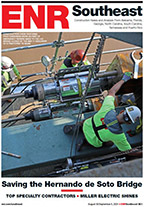The former resident engineer on a Kentucky bridge painting project where federal agents have charged an inspector with taking kickbacks has requested records of his complaints about the corruption allegedly made to more senior staff members of the Kentucky Transportation Cabinet. He claims that those complaints were ignored and that he was penalized for making them.
 |
| PAINT JOB Louisville bridge is center of suit over power washing specifications. |
The engineer, Ron Gardner, has filed a lawsuit in state court in Frankfort under the state whistleblower's law. He claims he was demoted after reporting that bridge inspectors solicited bribes, padded timesheets and accepted substandard materials on the John F. Kennedy Bridge at Louisville. A grand jury last month indicted inspector Kevin Lee Earles in connection with the scheme.
The possibility that senior cabinet staff were given information about the alleged corruption raises several questions. Some involved in the case speculate that the kickback conspiracy and the large amounts allegedly sought point to a broader conspiracy. Undercover federal agents say they paid Earles bribes of $6,000 and $3,000. Others think cabinet officials may have misinterpreted problems on the job as solely a contract dispute. Federal officials say they are continuing their investigation.
The criminal case overlaps with a dispute between the cabinet and a contractor hired in 1999 to repaint the bridge. In a lawsuit, the contractor, Abhe & Svoboda, Prior Lake, Minn., its subcontractor and a surety accuse Earles, inspector Billy Strader and cabinet employee Scott Kring of allegedly soliciting bribes.
Soon after work began, Abhe & Svoboda claim it had trouble getting work inspected. In August 1999, the contractor claims that Earles used the euphemism "Bring in the Greeks" to elicit a payment from Abhe & Svoboda. According to a spokesman for the cabinet, Kring was an internal consultant at the cabinet who specialized in bridge painting and provided advice at projects around the state. He retired in August. Both Strader and Kring have denied the allegations in recent court motions and Strader has sued the contractor for libel.
Gardner served as resident engineer of Bullitt County, Ky., for about six weeks in October and November 2000. By that time, the cabinet and Abhe & Svoboda were in a dispute about the work and payments.
In requesting evidence, Gardner has asked the cabinet to detail and describe all of Gardner's allegations of misconduct made to Kring and eight other cabinet employees. Among those about whom information is sought are Barry Sanders, a district bridge construction manager; William Monhollan, a district chief engineer; and Dexter Newman, the cabinet's director of construction. There is no evidence that these officials violated any laws, but Gardner asked the cabinet to identify records of action taken about his complaints of corruption.
A spokesman for the cabinet declined to comment on Gardner's lawsuit. Gardner is seeking compensation for his lowered pay and for the effects of his mistreatment. Contacted at his desk in a cabinet office, Gardner declined to comment other than to say he still wants to work for the cabinet. "It's God, country and job," he says.
The contractor's lawsuit against the agency revolves around the power washing specification (ENR 12/24/01 p. 14). According to Abhe & Svoboda, the cabinet awarded it the $13-million contract in 1999 for an "experimental" power wash and painting job. The specification called for use of spot power tool cleaning to bare metal wherever bare steel, rust or mill scale was exposed. After surface preparation, the bridge was to be brush-painted with topcoats. The cabinet was sure that only 10% of the topcoat would be removed by the 7,000-psi power wash, the contractor claims.
When it became apparent that the power washing was removing lead-based undercoats, Abhe & Svoboda says it expressed concern to the cabinet but it took no action. The contractor says it engaged experts who showed that the specification should be changed and that the cabinet initially agreed. But the state didn't want to pay for extra work claimed by Abhe & Svoboda. After terminating the contractor, it wanted the surety and subcontractor Brighton Painting to finish the work, but waive all claims in exchange for changing the specification.
The cabinet refuses to comment on the case other than to say it will complete the job.





Post a comment to this article
Report Abusive Comment